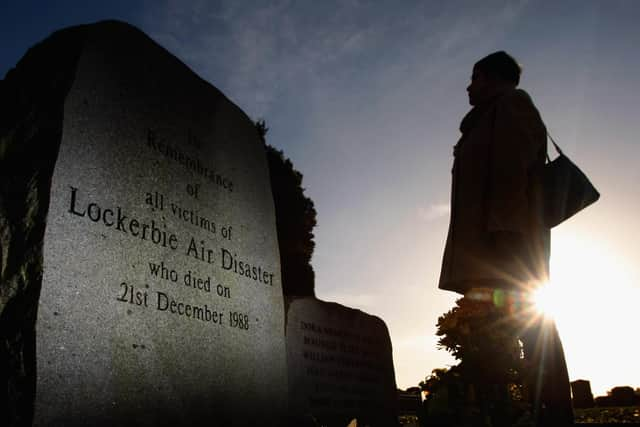Exclusive:Legal move to introduce video and telephone links for Lockerbie bombing trial
Eyewitnesses to the Lockerbie bombing and those who dealt with the immediate aftermath of the atrocity could be allowed to watch and listen live to new criminal court proceedings under plans drawn up by US politicians.
Under the legislative proposals, the surviving relatives of those who were killed in the December 1988 bombing, as well as those deemed to have suffered harm after being at, or near, the crash site, could be granted access to video and telephone links set up during the trial of Abu Agila Masud.
Advertisement
Hide AdAdvertisement
Hide AdThe Libyan national has been accused by US authorities of building the explosive that was used in the attack, which claimed the lives of 259 passengers and crew when Pan Am flight 103 was downed over the Scottish town as it travelled from London to New York. A further 11 people in Lockerbie died when the wreckage of the aircraft destroyed their homes.
Masud has been charged with two counts of destruction of an aircraft resulting in death and a count of destruction of a vehicle resulting in death. He pleaded not guilty to all three charges when he appeared in a federal court in Washington DC in February.
Given the complexity of the case, no date has been set for his trial, but prosecutors from the US Department of Justice (DoJ) have already said that given the advancing age of many of the relatives of those who were killed, special provisions should be made so that they do not have to travel to the US capital to witness the legal proceedings in person.
While many American states permit cameras to televise courtroom proceedings, there remains a blanket ban across federal courts. Now, however, two senators have introduced legislation to the US Congress which backs the DoJ’s arguments, and which would ensure that the surviving relatives are able to secure remote access to the criminal case, as and when a trial begins.
Those behind the proposed new law, entitled the ‘Meaningful Access to Court Proceedings for Victims of Pan Am Flight 103 Act’, reason that a “significant portion” of the surviving victims and next of kin are elderly, or physically unable of attending criminal proceedings in Washington DC in person. If ratified, the legislation would secure access not only for the relatives of victims in the US, but those in Scotland and further afield.


The wording of the proposed law specifies that anyone who suffered “direct or proximate harm” as a result of the bombing, and who was present at or near the scene of the tragedy, to access the remote video and telephonic facility at the US court. That could mean that those who witnessed the aircraft crash in Lockerbie, and dealt with the immediate aftermath, could take part in the remote initiative.
The bill has been introduced by Republican senator John Cornyn and his Democratic counterpart, Kirsten Gillibrand. Both argue that the new measure would allow those impacted by the atrocity to see justice play out, no matter where in the world they are based.
Mr Cornyn explained: “For more than three decades, the families of the 270 individuals tragically killed in the bombing of Pan Am flight 103 have waited for those responsible to be held accountable for this unspeakable act of terror. This legislation would ensure surviving family members can access the criminal court proceedings no matter where they live, and I urge my colleagues to pass it without delay.”
Advertisement
Hide AdAdvertisement
Hide AdMs Gillibrand added: “The families of the 270 victims on board Pan Am flight 103, including 190 Americans and 35 Syracuse University students, deserve transparency and answers. They have the right to view the proceedings of this trial and I am introducing this legislation to make sure they can.”


In its submissions to the Washington DC court, the DoJ also argues that “alternative procedures” should be considered “appropriate.” One document, filed by Matthew Graves, the US district attorney for the District of Columbia, points out that the victims included citizens from 21 countries, including 190 Americans and 43 British nationals.
Mr Graves also said that even in the event all the relatives of the victims were able to attend the court, there would be questions about whether they could be facilitated, given the size of the group. His submission asks for a “call-in telephone line” that would allow people to listen to court proceedings in real time.
The DoJ first announced criminal charges against Abu Agila Masud in December 2020. US prosecutors alleged the defendant, who has ties to Libya and Tunisia, worked for decades as an explosives expert for Libya's intelligence service, and was directed by officials there to prepare a suitcase bomb to detonate when the American-bound flight was in midair.
The complexity of the case has involved tens of thousands of documents changing hands so far as part of the formal discovery process, whereby the parties exchange information. Court documents filed in the US indicate that the documents exchanged to date include approximately 15,000 witness statements collected by Police Scotland. More than 800 items that Scottish prosecutors lodged during their indictment against Abdulbasset al-Megrahi also form part of the new case.
Megrahi, the only person to have been convicted in connection with the deadliest terror attack in UK history, stood trial at the specially convened Scottish court in the Netherlands, where he was found guilty of mass murder and jailed for life. He was released from prison in 2009 on compassionate grounds by the Scottish Government after he was diagnosed with cancer He died in Libya three years later.